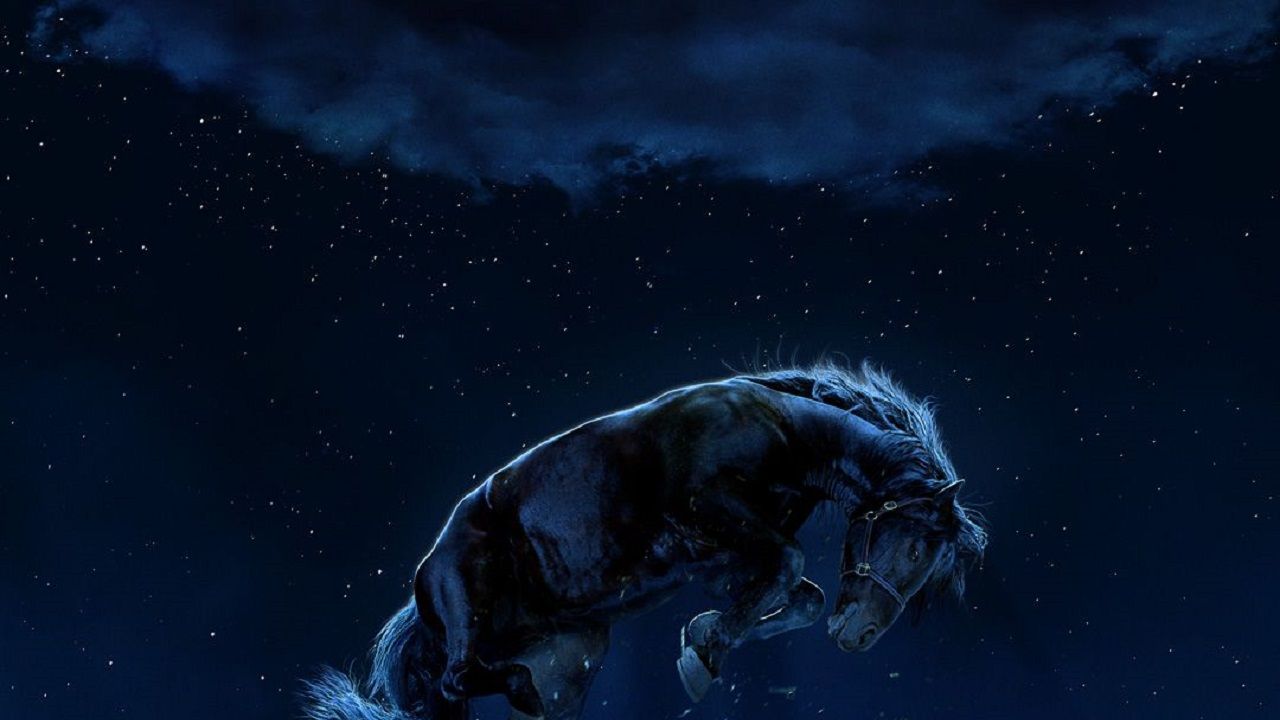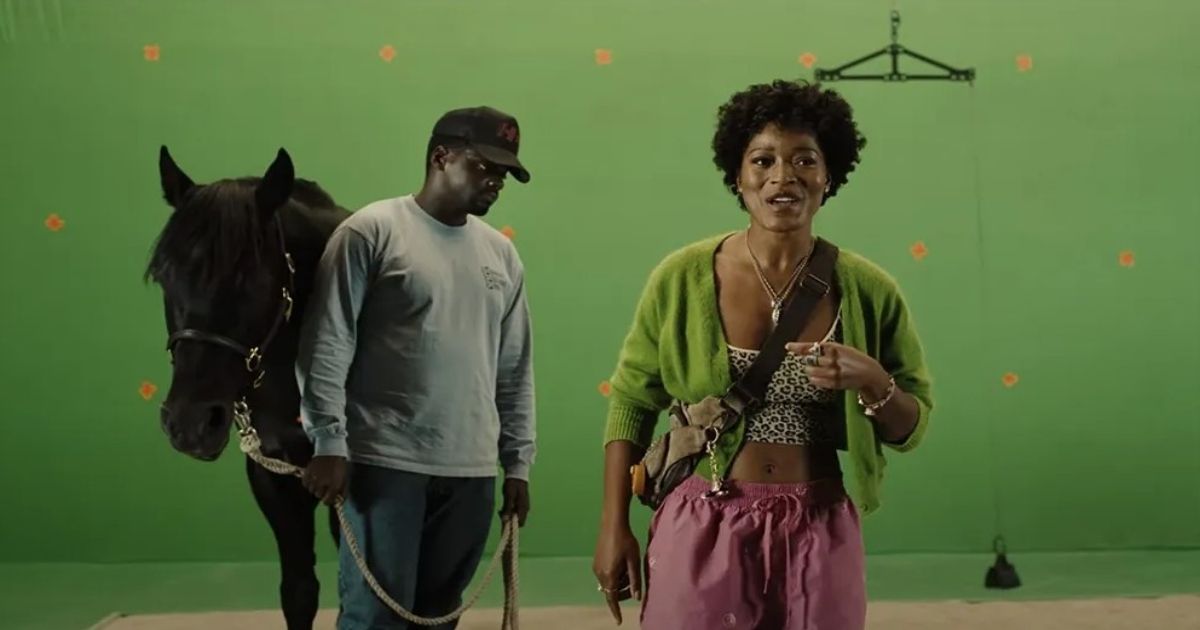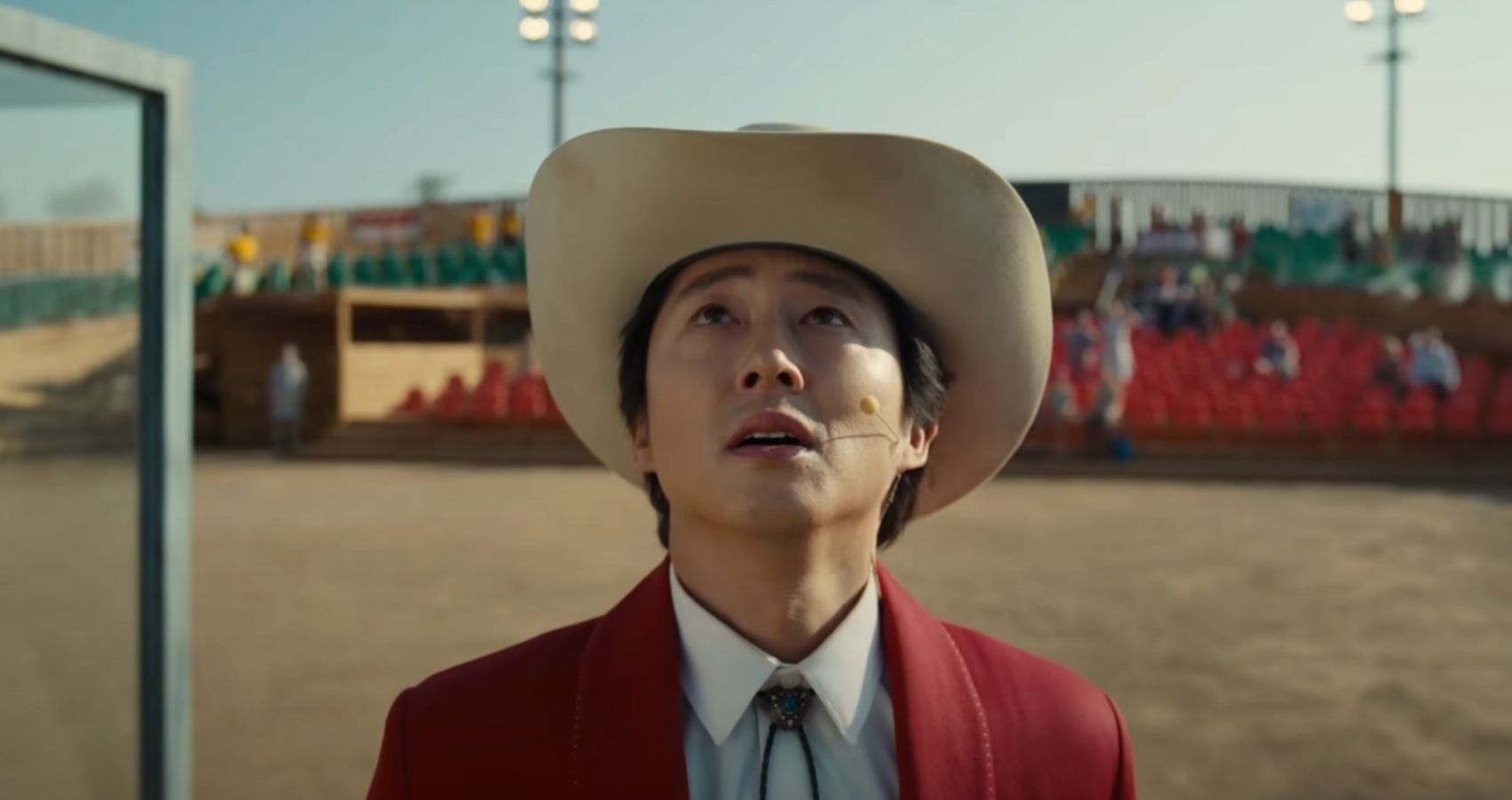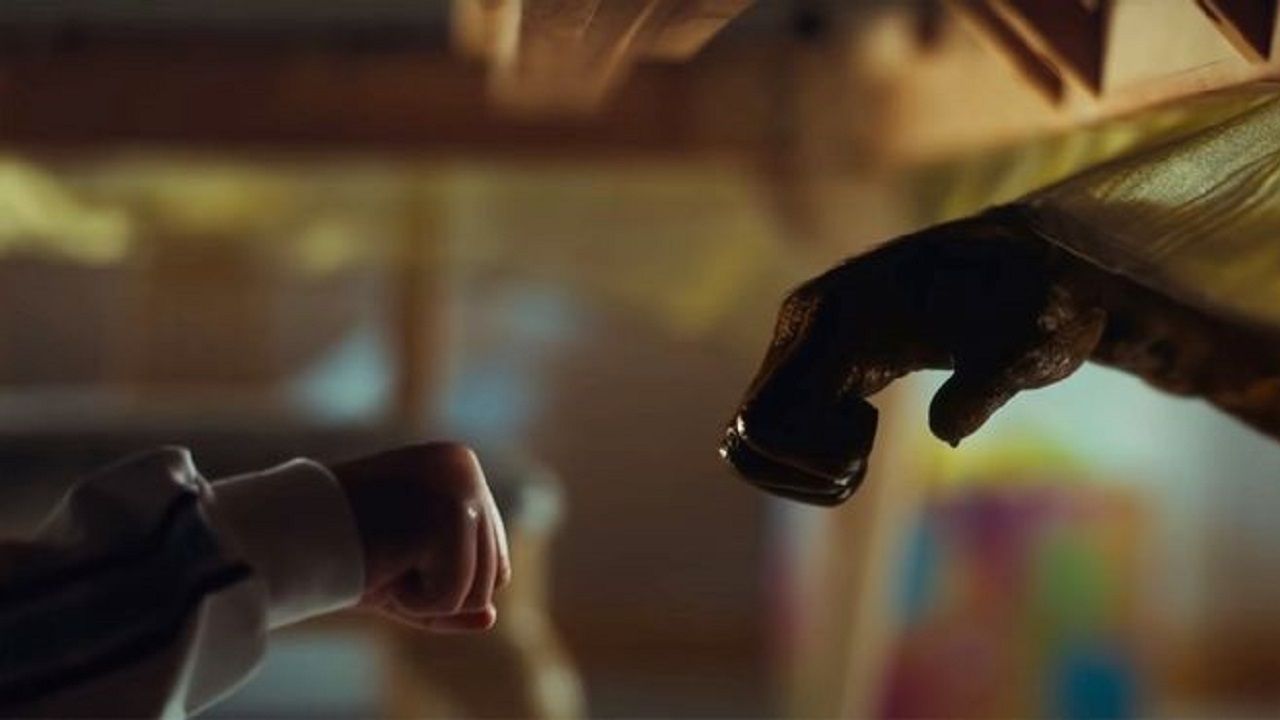What do UFOs, the history of Black representation in Hollywood, and Steven Yeun in a ten-gallon hat have in common? If you answered “very little,” think again — all are prominently featured in the trailer for 2022’s most anticipated horror event.
Horror auteur Jordan Peele returns this summer with Nope, described as a horror/western. Peele has shown no indication of moving away from his preferred mode, the social horror, which means the real monster will be human frailty as much as (… flying saucers? Extradimensional gods? An angry rain cloud? It’s too early to say). In a thriller that seems to include aliens, the film industry, and scary clouds, what kind of ideas can we expect to pop up in between the popcorn-spilling scares?
First, a little about the film set up as a classic paranormal thriller. An isolated community begins to experience unexplainable phenomena: animals become hysterical, lights flicker, objects move on their own. If this all feels familiar, that’s probably the point. What makes Peele such an interesting filmmaker is not the originality of his premises but how he understands and repurposes genre tropes to overtly tackle material seldom depicted directly in scary movies. How he plans to subvert this sub-genre remains to be seen. However, the trailer cues us into a few elements Peele will undoubtedly synthesize with popcorn thrills into a meaningful and entertaining movie.
Representation & Treatment of Black Americans in Hollywood
Before any thrills or scares, Peele hits us with a piece of film history — the first motion picture was of a Black man on a horse. This may come as a shock to those who assume African American Cinema is a relatively recent phenomena, blocked for decades by institutional racism. In fact, there have been Black innovators and trailblazers in front of and behind the camera from cinema's inception. Their contributions have been forgotten and downplayed by a racially biased canon. Nope makes a point of highlighting this fact.
This history of contribution, representation, and exclusion goes back to the silent era. Oscar Micheaux (1884 — 1951) was the first major African-American feature filmmaker, a prominent producer of “race films” (i.e., films by and for Black people, focussing on contemporary African-American life). Also significant was the Lincoln Motion Picture Company, an early studio founded in 1916 by brothers Noble and George Perry Johnson. The company was short-lived but made major contributions to a cinema separate from the exclusionary white mainstream product. These are only two examples in a sprawling list of forgotten innovators.
Noble Johnson is a particularly fascinating figure in the context of this history. As a producer, he created films that uplifted and depicted Black people as they really were. He was also a Hollywood actor (using his salary in part to finance Lincoln), playing racist caricatures of Black people, Native Americans, Latines, and nationally ambiguous “Natives” (this dichotomy is one Peele has explored before, in the Key and Peele sketch “Dad’s Hollywood Secret”). This is one of many examples of the obstacles and demeaning situations Black artists faced as they struggled for agency in a burgeoning industry.
In Nope, protagonists James and Jill Haywood are the great-great-great grandchildren of the man on the horse in the very first motion picture, a point of pride for the heads of the only Black-owned horse training business in Hollywood. It is no doubt impressive that they own such a business, but why are they the only Black owners in the industry? Horses are one of the most employed animals in Hollywood. The fact that there is only one Black-owned business accommodating those needs is a pretty clear indication of persisting inequality.
This is not to say that Nope will be about race. In an episode of Variety’s Playback Podcast promoting Get Out (2017), Peele noted that his other films will be social horrors but will focus on different human monsters. Get Out focussed on racism, while Us (2019) focused on class and made a point of ignoring race/ethnicity. Though, subtext concerning Black identity, particularly in the context of upward mobility, can be drawn from that film.
Whether the history of Black Hollywood is a prominent thematic point or merely an element of the Haywood’s background remains to be seen. Still, it’s exciting that a genre filmmaker chose to introduce audiences to his new film by focussing on such a rich and unsung history.
The Relationship Between the Western, American Identity, & Nationalism
Nope will be a horror film, but it also expands Peele’s toolbox into the realm of the Western. It’s possible that the film’s Western themes go no deeper than the setting. But given the emphasis on Hollywood history and potential alien invasion, a series of thematic possibilities open up.
The Western is perhaps the quintessential American film genre. It is a reflection of American ideals and self-conceptions — individual freedom, the taming of a wild landscape, the pull between lawfulness and personal codes of honor. These ideas have a clear origin in America's sins of the past: colonialism, manifest destiny, and white nationalism. The wild landscape the cowboy must tame is tied to the “savages” that inhabit it, namely, indigenous peoples. As a symbol in American film, the “savage Indians” represent not only the tribes that were displaced and massacred but the various ethnic minorities America has exploited and scapegoated, particularly African-Americans. Yet, the cowboy represents America itself, a multicultural nation. American viewers of any ethnicity are inclined to root for this symbol of their nation.
In an interview featured in I Am Not Your Negro (2016), James Baldwin describes this ambivalent relationship:
“It comes as a great shock, around the age of five or six or seven, to discover that Gary Cooper killing off the Indians when you were rooting for Gary Cooper, that the Indians were you […] the country which is your birthplace and to which you owe your life and identity has not in its whole system of reality evolved any place for you.”
As a Western, Nope is different from the kind of film Baldwin describes in two ways: it is contemporary and does not deal with the myth of the West. The only figures we’ve seen in the trailer resembling the archetypal cowboy are played by Steven Yeun, Daniel Kaluuya, and Keke Palmer, all actors of color. It’s also important to note that there have been a number of Revisionist Westerns that challenge the racist attitudes of Classic Westerns, some by Black creators and focusing on Black characters (e.g., the Westerns of Sidney Poitier). It’s possible that Nope’s Western imagery is in this mode, and is not meant to allude to the ghosts of the past. This recasting of the Cowboy to reflect the diversity of American life (and the actuality of American history, which has always been multicultural, regardless of the dominant narrative) can be empowering as a means of revising the image of American Freedom in popular culture. It could be argued that the figure of the cowboy in the Western is inherently a symbol of forceful colonization, one that will always have racist undertones regardless of who wears the ten-gallon hat. Which way Nope leans remains to be seen.
Peele knows movie genres like the back of his own hand and has used their archetypes for symbolic value in his previous films. Will Nope examine the idea of the Western and its relation to American history? If so, how does this connect to floating horses and weird lights?
The Fear of Invasion, Colonization, & the Other
If cinema reflects how we view the world, then the world is filled with Others that must be overcome. This is true in traditional horror, western, and alien-invasion films. Yet Peele has asserted in his own films that the monster is within. If there is an Other, it is because we need them to exist. The Other is Us, the parts of ourselves we fear and cannot accept, often projected onto a scapegoat.
This theme is likely to appear in Nope. Whether the supernatural force is really alien or something else entirely, the ad campaign has made it seem like the film is about an alien invasion — and this is crucial. Films concerning alien invasion have come and gone in waves throughout film history, and their release almost always coincides with political anxieties about invasion/foreign forces that mean “us” harm. Similarly, the alien is a prominent symbol of the Other, malevolent (War of the Worlds), misunderstood (E.T.: The Extra-Terrestrial), or oppressed (District Nine).
Given this kind of story, a Californian setting with Western genre tropes is especially provocative. After all, if alien forces are coming to forcefully remove and subjugate the land’s population, it would not be the first time something like that has happened. Whatever force invades this community, it will probably bring up tensions, fears, mistrust, and prejudice buried in its land’s history and community members’ psyches.
Nope invades theaters on July 22, 2022.




